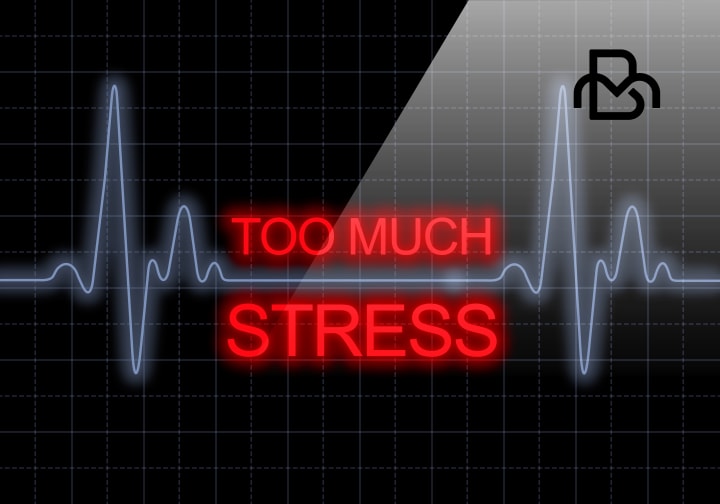The Mind-Heart Connection
How Stress Affects Cardiovascular Health

Picture this: it's Monday morning, you're running late for work, and your trusty car decides to give up the ghost. As you frantically call for a tow, your heart races, and the stress levels rise. But have you ever stopped to think about the connection between that stress and your cardiovascular health? Strap in for a wild ride through the mind-heart connection and discover how to manage stress for a healthier ticker.
The Stress Train: Understanding the Link Between Stress and Heart Health
All aboard the stress train! As we chug along in our daily lives, stress can feel like a constant companion. But did you know that stress can have serious consequences for your heart? When the body encounters stress, it releases stress hormones like adrenaline and cortisol, which can lead to an increase in heart rate and blood pressure.

Over time, this can contribute to the development of heart disease. So, it's important to learn how to manage stress to keep our hearts healthy and strong.
The Balancing Act: How the Body Tries to Keep Stress in Check
Picture a tightrope walker, skillfully balancing on the rope, making sure not to fall. That's how our bodies try to manage stress - it's all about balance!

Our bodies have a built-in stress response system called the autonomic nervous system, which works to maintain an equilibrium between the "fight or flight" response and the "rest and digest" response. However, when stress becomes chronic, this delicate balance can be disrupted, leading to negative effects on our cardiovascular health.
The Tug of War: How Chronic Stress Affects the Heart
Imagine a never-ending game of tug-of-war between your mind and your heart. That's what chronic stress can feel like, and it's not doing your heart any favors.

Over time, the constant exposure to stress hormones can damage the blood vessels and heart muscle, increasing the risk of conditions like high blood pressure, heart attack, and stroke. So, it's crucial to find ways to manage stress and protect your heart from its harmful effects.
The Breathing Room: How Deep Breathing Exercises Can Help Keep Stress at Bay
Ever feel like you're underwater, struggling to catch your breath? One way to manage stress and promote heart health is by practicing deep breathing exercises. When we breathe deeply, it helps to activate the body's "rest and digest" response, which can counteract the effects of stress.

Not only does deep breathing help to lower blood pressure and heart rate, but it can also improve overall cardiovascular function. So, take a deep breath and dive into the healing power of mindful breathing.
The Flexibility Factor: How Yoga and Mindful Movement Can Improve Heart Health
Picture a rubber band - the more you stretch it, the more flexible it becomes. The same goes for our bodies and minds! Practicing yoga and other mindful movement exercises can help to increase flexibility, improve circulation, and reduce stress.

By incorporating yoga and other stress-relieving activities into our daily routines, we can help protect our hearts from the damaging effects of chronic stress.
The Laughter Prescription: How a Good Guffaw Can Boost Heart Health
They say laughter is the best medicine, and when it comes to stress and heart health, it's no joke! Research has shown that laughter can help to reduce stress hormones and increase "feel-good" endorphins. This can help to improve blood flow, lower blood pressure, and boost overall cardiovascular health. So, go ahead and chuckle your way to a healthier heart - your ticker will thank you!
The Power of Connection: How Social Support Can Improve Cardiovascular Health
Ever notice how a heartfelt conversation with a friend can make your heart feel lighter? Social support plays a significant role in managing stress and promoting heart health. Studies have shown that people with strong social connections tend to have lower blood pressure, healthier cholesterol levels, and better overall cardiovascular health. So, don't be shy - reach out to friends and loved ones to help keep stress at bay and your heart healthy and strong.

The Stress-Free Sanctuary: Creating a Calming Environment for a Healthy Heart
Picture your ideal stress-free zone - perhaps it's a cozy nook filled with plush pillows, calming scents, and soothing sounds. Creating a calming environment can play a significant role in managing stress and promoting heart health. Surrounding yourself with elements that promote relaxation, such as soft lighting, relaxing music, or comforting textures, can help to create a sense of peace and tranquility. By cultivating a stress-free sanctuary, you're giving your heart the love and care it deserves.
And there you have it - a whirlwind tour through the mind-heart connection and how managing stress can lead to a healthier, happier ticker. From deep breathing exercises to laughter and social connections, there's a whole world of stress-busting techniques waiting for you to explore. So, take a deep breath, have a good laugh, and remember to nurture your heart - after all, it's the only one you've got!
About the Creator
Mohammad Barbati
Mohammad E. Barbati, MD, FEBVS, is a consultant vascular and endovascular surgeon at University Hospital RWTH Aachen. To date, he has authored several scientific publications and books regarding vascular and venous diseases.






Comments
There are no comments for this story
Be the first to respond and start the conversation.